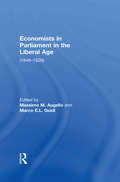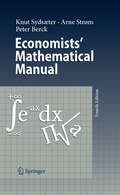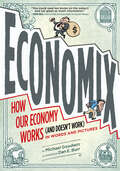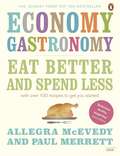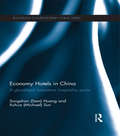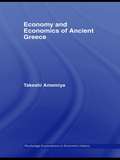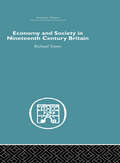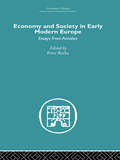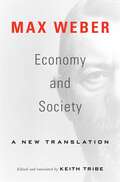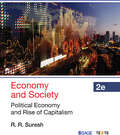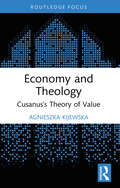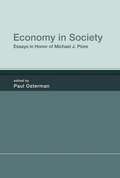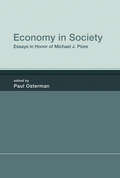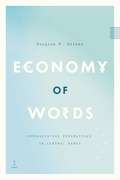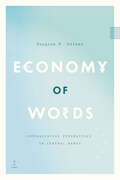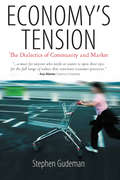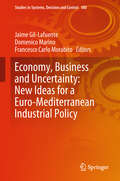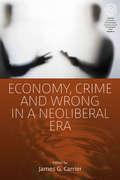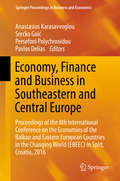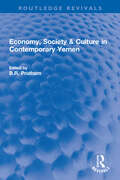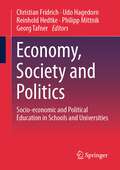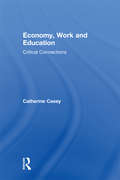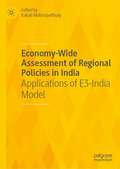- Table View
- List View
Economists in Parliament in the Liberal Age: (1848–1920)
by Marco E.L. GuidiThis detailed volume explores the role and actions of economists in US, Japanese and various European parliaments in the critical period between 1848 and 1920. Featuring chapters written by an international array of contributors from both economics and history, the book provides fascinating insights into the parliamentary life in the period. It highlights the often pivotal role of economists within each administration; examines their influence on policy making, their relationships with other MPs, civil servants, external economic associations and looks at the influence of public opinion on economic policy. The book also discusses the nature of the economic discourse practised in the parliamentary arena, considering the complex relationships between science and practice, and between politics and political economy in light of the evolution of economics during this period. The book is the first of its kind to provide a comparative framework for analysis, and will appeal to economists and historians alike.
Economists' Mathematical Manual
by Knut Sydsaeter Peter Berck Arne StrømThis volume presents mathematical formulas and theorems commonly used in economics. It includes both formulas like Roy`s identity that are peculiar to economics and formulas like Leibniz's rule that are common to many areas of applied mathematics. The volume is meant to be a reference work, to be used by students in conjunction with a textbook and by researchers in need of exact statements of mathematical results. The volume is the first grouping of this material for a specifically economist audience.
Economists' Perspectives on Leadership
by Patrick Bolton Markus K. BrunnermeierThe authors of this chapter acknowledge that leadership has received limited attention in economics. They note that classical economics treats the firm as a "black box" production function, ignoring the role of leadership. Building on the principal-agent framework, they introduce an economic model of leadership that defines an organizational leader's challenge as credibly communicating a mission that enables coordinated actions by followers in the face of potential changes. First, the leader receives information about the environment and defines a mission statement-the vision component of leadership-and communicates it to followers. Next, followers, using their own information about the environment, choose a course of action. After this, the leader gets new information about the environment, which is incorporated into a strategy for implementation. High payoffs result from a well-coordinated execution of strategy that is also well suited to the organizational context. This chapter was originally published as Chapter 9 of "Handbook of Leadership Theory and Practice: A Harvard Business School Centennial Colloquium."
Economix: How and Why Our Economy Works (and Doesn't Work), in Words and Pictures
by Michael GoodwinNew York Times–Bestseller: An “engrossing” history of economics, from an author with “excellent storytelling skills” and an Eisner Award-winning artist (Boing Boing).Stimulus plans: good or bad? Free markets: How free are they? Jobs: Can we afford them? Capitalism, socialism, and communism: What’s the difference? Corporations: Are they people?For those who want to better understand what Wall Street and Washington know (or say they know), this graphic history, with clear, witty writing and quirky, entertaining art, transforms “the dismal science” of economics into a fun, fact-filled story about human nature and our attempts to make the most of what we’ve got.“Quite accessible . . . Goodwin brilliantly contextualizes economic theories with historical narrative, while Burr’s simple but elegant illustration employs classical techniques like caricaturing politicians and symbolizing big businesses (as a gleeful factory) to help the reader visualize difficult concepts.” —Publishers Weekly (starred review)“You could read ten books on the subject and not glean as much education.” —David Bach, #1 New York Times–bestselling author of The Automatic Millionaire“I just cannot stress enough how amazing this book is!”—Wired
Economy Gastronomy: Eat well for less
by Allegra McEvedy Paul MerrettLearn how to eat better and spend less with deliciously easy recipes 'Delicious, thrifty, inspiring' GUARDIAN Featuring over 100 mouth-watering recipes and practical tips, Economy Gastronomy will help you to cook simple, better food, and along the way save you a lot of money_______With this essential cookery companion, you will learn how to . . . - Get two, or even three, meals out of one basic ingredient - Turn leftovers into new and exciting dishes - Stock your cupboards so there's always a meal in the house - Shop seasonally, freeze and store food - Plan your meals and shrink your food bills With breakfasts, lunch, dinner, snack and treat ideas, you'll be making luxurious meals without spending a fortune or discarding surplus food in no time. Recipes include: - Caramelised onion and Cheshire cheese tart - Onion bhajis, tarka dahl and almond rice - Spinach, ham and ricotta gnocchi - Chinese-style crispy duck Filled with money-saving hacks and no-nonsense recipes, Economy Gastronomy will teach you how to use and spend less, without scrimping on flavour.
Economy Hotels in China: A Glocalized Innovative Hospitality Sector (Routledge Contemporary China Series)
by Songshan Huang Xuhua SunWhile economy or budget hotels have been popular in western countries since the end of the Second World War, they have only emerged as a sector in their own right in China since the mid-1990s. Indeed, as a new service industry sector, economy hotels in China demonstrate important characteristics which can be used to illustrate and help explain China’s current economic progress more generally. This book provides a comprehensive overview of the economy hotel sector in China. It covers macro-level social-cultural, economic, environmental, geographic and development issues, alongside micro-level consideration of the budget hotel companies’ innovative management and marketing procedures, business expansion strategies, general hotel management and operation issues, as well as an analysis of some leading entrepreneurs in the sector, and in-depth case studies examining the most successful economy hotel companies in China. Huang and Sun argue that the rapid development of budget hotels in China demonstrates how, under the influence of globalisation, Chinese businesses have become more innovative as they apply successful western business models to China. In turn, they show that the China model is fundamentally different in terms of its driving force, which lies purely in its domestic travel market, fuelled by China's continued economic growth. There is therefore much to explore about both China’s market situation and business practices in the economy hotel sector and this book makes an important contribution to our understanding of China’s new business environment. Based on extensive fieldwork and investigation, Economy Hotels in China will be welcomed by students and scholars of tourism, hospitality, business studies and Chinese studies, but it will also appeal to practitioners of business management in these sectors who are interested in China’s development and business opportunities in China.
Economy Shipping Co.
by Pearson HuntThe situation requires a decision to repair a steam river boat, to substitute a diesel-powered boat, or to lease a diesel boat.
Economy and Economics of Ancient Greece (Routledge Explorations In Economic History Ser.)
by Takeshi AmemiyaAddressing the dearth of literature that has been written on this key aspect of economic history, Takeshi Amemiya, a well known leading economist based at Stanford University, analyzes the two diametrically opposed views about the exact nature of the ancient Greek economy, putting together a broad and comprehensive survey that is unprecedented in t
Economy and Society in 19th Century Britain
by Richard TamesFirst Published in 2005. Routledge is an imprint of Taylor & Francis, an informa company.
Economy and Society in Early Modern Europe: Essays from Annales
by Peter BurkeIn 1929 two French historians, Lucien Febvre and Marc Bloch, founded Annales, a historical journal which rapidly became one of the most influential in the world. They believed that economic history, social history and the history of ideas were as important as political history, and that historians should not be narrow specialists but should learn from their colleagues in the social sciences. Two of the most distinguished French members of the Annales school are represented in this volume - Fernand Braudel and Emmanuel Le Roy Ladurie - the core of which is the debate on the Price Revolution of the sixteenth century dealt with by Cipolla, Chabert, Hoszowski and Verlinden. Within the volume, all the contributions are oriented towards Europe in the sixteenth and seventeenth centuries, and all are concerned with long-term changes, and with the relation between economic growth and social change. It includes articles on the European movement of expansion discussed by Malowist and the activities of the Hungarian nobles as entrepreneurs discussed by Pach, and two articles on wider issues: Le Roy Ladurie on the history of climate, and Braudel, summing up the Annales programme, on the relation between history and the social sciences. This classic text was first published in 1972.
Economy and Society: A New Translation (People, Markets, Goods: Economies And Societies In History Ser. #Volume 10)
by Max WeberKeith Tribe’s new translation presents Economy and Society as it stood when Max Weber died. One of the world’s leading experts on Weber’s thought, Tribe has produced a clear and faithful translation that will become the definitive English edition of one of the few indisputably great intellectual works of the past 150 years.
Economy and Society: Political Economy and Rise of Capitalism
by R. R. SureshThe second revised and updated edition continues to focus on the emergence, evolution and working of the capitalist system with the help of some of the major principles and theories of economics. The revised second edition of this textbook continues to focus on the emergence, evolution and working of the capitalist system with the help of some of the major principles and theories of economics. Economy and Society relates economic life to other aspects of our lives - social, cultural, political, religious and intellectual. It comprehensively analyses the importance of politics and culture to the functioning of the economy. Instead of presenting a traditional analysis of the capitalist system, this edition explores the relationship between economy and society. It examines the Marxist approach to the evolution of human civilizations in terms of thesis, anti-thesis and synthesis. Key Features: • Topical coverage as per the UGC syllabus of Political Economy I and II • Provides a holistic understanding of each topic, covering information on major works on each theme • A student-friendly approach for a difficult subject in lucid language • Each chapter aided by insightful pedagogical features such as learning outcomes, key terms and points for classroom discussion
Economy and Theology: Cusanus’s Theory of Value (ISSN)
by Agnieszka KijewskaEconomy and Theology: Cusanus's Theory of Value, a study from the field of the history of philosophy, responds to the present-day interest in what is referred to as economic theology. This study aims to show that value (valor), one of the fundamental concepts of contemporary philosophy and economics, has its genealogy in the thought of Nicholas of Cusa. Starting from the economic context (the concept of price/pretium), Cusanus proposes the theory of value that, on the one hand, is objectively rooted in the Divine act of creation (God as the Minter) and, on the other hand, requires reading by human beings (human mind as a banker). While this theory appears in Cusanus’s late work The Bowling-Game, it is underpinned by his theory of knowledge, theory of human beings and human cognition against the background of his vision of the universe. Thus, the aim of the book is to try to answer the question about the role and tasks of human beings as a principal player in economic and social game. This description of human position emerges from the creative tension between human philosophical and theological reflection and certain economic solutions.
Economy in Society
by Paul OstermanIn Economy in Society, five prominent social scientists honor Michael J. Piore in original essays that explore key topics in Piore's work and make significant independent contributions in their own right. Piore is distinctive for his original research that explores the interaction of social, political, and economic considerations in the labor market and in the economic development of nations and regions. The essays in this volume reflect this rigorous interdisciplinary approach to important social and economic questions.M. Diane Burton's essay extends our understanding of internal labor markets by considering the influence of surrounding firms; Natasha Iskander builds on Piore's theory of immigration with a study of Mexican construction workers in two cities; Suzanne Berger highlights insights from Piore's work on technology and industrial development; Andrew Schrank takes up the theme of regulatory discretion; and Charles Sabel discusses theories of public bureaucracy.
Economy in Society: Essays in Honor of Michael J. Piore
by edited by Paul OstermanProminent economists discuss internal labor markets, the dynamics of immigration, labor market regulation, and other key topics in the work of Michael J. Piore. In Economy in Society, five prominent social scientists honor Michael J. Piore in original essays that explore key topics in Piore's work and make significant independent contributions in their own right. Piore is distinctive for his original research that explores the interaction of social, political, and economic considerations in the labor market and in the economic development of nations and regions. The essays in this volume reflect this rigorous interdisciplinary approach to important social and economic questions.M. Diane Burton's essay extends our understanding of internal labor markets by considering the influence of surrounding firms; Natasha Iskander builds on Piore's theory of immigration with a study of Mexican construction workers in two cities; Suzanne Berger highlights insights from Piore's work on technology and industrial development; Andrew Schrank takes up the theme of regulatory discretion; and Charles Sabel discusses theories of public bureaucracy.
Economy of Words: Communicative Imperatives in Central Banks
by Douglas R. HolmesMarkets are artifacts of language--so Douglas R. Holmes argues in this deeply researched look at central banks and the people who run them. Working at the intersection of anthropology, linguistics, and economics, he shows how central bankers have been engaging in communicative experiments that predate the financial crisis and continue to be refined amid its unfolding turmoil--experiments that do not merely describe the economy, but actually create its distinctive features. Holmes examines the New York District Branch of the Federal Reserve, the European Central Bank, Deutsche Bundesbank, and the Bank of England, among others, and shows how officials there have created a new monetary regime that relies on collaboration with the public to achieve the ends of monetary policy. Central bankers, Holmes argues, have shifted the conceptual anchor of monetary affairs away from standards such as gold or fixed exchange rates and toward an evolving relationship with the public, one rooted in sentiments and expectations. Going behind closed doors to reveal the intellectual world of central banks,Economy of Words offers provocative new insights into the way our economic circumstances are conceptualized and ultimately managed.
Economy of Words: Communicative Imperatives in Central Banks
by Douglas R. HolmesMarkets are artifacts of language—so Douglas R. Holmes argues in this deeply researched look at central banks and the people who run them. Working at the intersection of anthropology, linguistics, and economics, he shows how central bankers have been engaging in communicative experiments that predate the financial crisis and continue to be refined amid its unfolding turmoil—experiments that do not merely describe the economy, but actually create its distinctive features. Holmes examines the New York District Branch of the Federal Reserve, the European Central Bank, Deutsche Bundesbank, and the Bank of England, among others, and shows how officials there have created a new monetary regime that relies on collaboration with the public to achieve the ends of monetary policy. Central bankers, Holmes argues, have shifted the conceptual anchor of monetary affairs away from standards such as gold or fixed exchange rates and toward an evolving relationship with the public, one rooted in sentiments and expectations. Going behind closed doors to reveal the intellectual world of central banks,Economy of Words offers provocative new insights into the way our economic circumstances are conceptualized and ultimately managed.
Economy's Tension: The Dialectics of Community and Market (Berghahn Ser.)
by Stephen GudemanWhy are we obsessed with calculating our selections? The author argues that competitive trade nurtures calculative reason, which provides the ground for most discourses on economy. But market descriptions of economy are incomplete. Drawing on a range of materials from small ethnographic contexts to global financial markets, the author shows that economy is dialectically made up of two value realms, termed mutuality and impersonal trade. One or the other may be dominant; however, market reason usually cascades into and debases the mutuality on which it depends. Using this cross-cultural model, the author explores mystifications of economic life, and explains how capital and derivatives can control an economy. The book offers a different conception of economic welfare, development, and freedom; it presents an approach for dealing with environmental devastation, and explains the growing inequalities of wealth within and between nations.
Economy, Business and Uncertainty: New Ideas for a Euro-Mediterranean Industrial Policy (Studies in Systems, Decision and Control #180)
by Jaime Gil-Lafuente Francesco Carlo Morabito Domenico MarinoThis book presents original research articles addressing various aspects of economics, management and optimization. The topics discussed include economics, finance, marketing, resource allocation strategies, fuzzy logic, and network-based techniques for the analysis of economics, management and mathematical optimization.Combining the input of contributing professors and researchers from various Spanish, Italian and Latin American universities, the book will be of interest to students, researchers and practitioners, as well as members of the general public interested in the world of Economics and Management.
Economy, Crime and Wrong in a Neoliberal Era (EASA Series #36)
by James G. CarrierCorporate scandals since the 1990s have made it clear that economic wrong-doing is more common in Western societies than might be expected. This volume examines the relationship between such wrong-doing and the neoliberal orientations, policies, and practices that have been influential since around 1980, considering whether neoliberalism has affected the likelihood that people and firms will act in ways that many people would consider wrong. It furthermore asks whether ideas of economic right and wrong have become so fragmented and localized that collective judgement has become almost impossible.
Economy, Finance and Business in Southeastern and Central Europe: Proceedings Of The 8th International Conference On The Economies Of The Balkan And Eastern European Countries In The Changing World (ebeec) In Split, Croatia 2016 (Springer Proceedings In Business And Economics )
by Anastasios Karasavvoglou Persefoni Polychronidou Srećko Goić Pavlos DeliasThis volume comprises papers presented at the 8th international conference “The Economies of the Balkan and Eastern European Countries in the Changing World” (EBEEC) held in Split, Croatia in 2016. The papers cover a wide range of current issues relevant for the whole of Eastern Europe, such as European integration, economic growth, labour markets, education and tourism. Written by experienced researchers in the field of economic challenges for Eastern Europe, the papers not only analyse recent problems, but also offer policies to resolve them. Furthermore, they offer insights into the theoretical and empirical foundations of the economic processes described. The proceedings of the conference appeals to all those interested in the further economic development of the Balkan and Eastern European countries.
Economy, Society & Culture in Contemporary Yemen (Routledge Revivals)
by B. R. PridhamFirst published in 1985, Economy, Society & Culture in Contemporary Yemen was written to present a wealth of research and thinking that was new to the field at the time of original publication. The book covers a wide range of topics, including socio-economic development, agriculture, land use, fiscal policies, emigration, health, education, and politics. In doing so, it provides a close analysis of the situation in Yemen in the 1980s whilst exploring recent developments of the preceding years. It will appeal to those with an interest in the history of Yemen.
Economy, Society and Politics: Socio-economic and Political Education in Schools and Universities
by Christian Fridrich Reinhold Hedtke Georg Tafner Udo Hagedorn Philipp MittnikThe interconnections of economy, society and politics so obviously determine socio-economic and political structures and problem situations, current ways of thinking and acting as well as the collective perception of solution options that their still low attention in university teaching and school education is surprising. Phenomena such as pandemics, climate change, migration or authoritarianism make the close, complex and contradictory connections between economy, society and politics tangible. Against this background, socioeconomic research, teaching and education are urgently needed. The theme volume aims to contribute to this by presenting research contributions on problem complexes such as economy and democracy, perspectivity and multiperspectivity, situation, interest and politics, subject and subjectification, and discipline and curriculum.
Economy, Work, and Education: Critical Connections (Routledge Advances in Management and Business Studies)
by Catherine CaseyEconomy, Work and Education: Critical Connections addresses effects of neoliberal capitalism in particular regard to work and education. The book elaborates key aspects and problems of generalized policy models of knowledge-based economies and learning societies in contexts of liberalized firm action, accelerated competitiveness and labor market flexibility. It discusses limits and paradoxes of higher skilled, knowledge-based economies which include significant disparities in labor market absorption of higher level skills, a deterioration of qualitative conditions of work and a re-subordination of workers. This volume provides a research-intensive crossing of these fields to contribute a closer disciplinary and scholarly dialogue between interested thinkers across fields who too often must labor and converse apart. It offers the vantage point afforded by traversing old boundaries and exploring concerns shared by many scholars and researchers in international circles in pursuit of social and cultural innovation in the governance of work and education and advancing wider social debate
Economy-Wide Assessment of Regional Policies in India: Applications of E3-India Model
by Kakali MukhopadhyayIn the fast-changing policy arena of a country as diverse as India, gauging regional implications of policy shifts is critical but challenging. E3-India is a policy evaluation tool based on the internationally recognized E3ME global model, that allows for iterative quantification of multiple policy options within an integrated economy-energy-environment framework to support wellinformed progressive policy choices at the regional level. This book provides comprehensive coverage of creating and using E3 modeling framework for regional policy analysis, which is available in public domain for the first time in India, addressing existing flagship Government of India policies, including but not limited to the Make in India initiative, Digital India initiative, Automotive Mission Plan, Nationally Determined Commitments under the Paris agreement, and the Atmanirbhar Bharat relief package. These studies have been designed to provide in-depth and lucid insights regarding choices for resource allocation by policymakers, thereby serving as a comprehensive guide for evidence-based policymaking in India.
